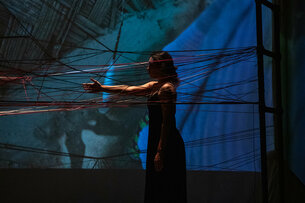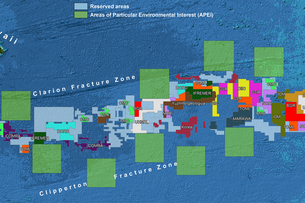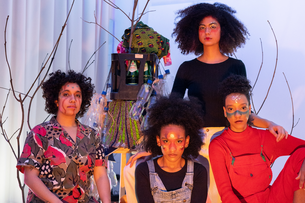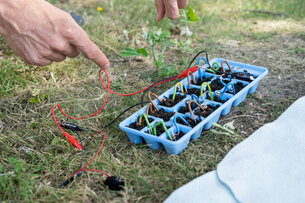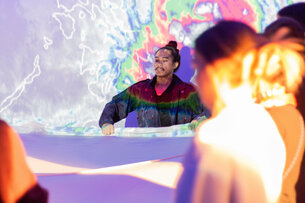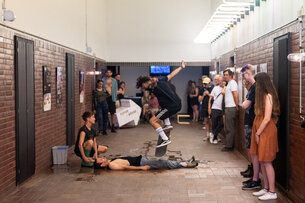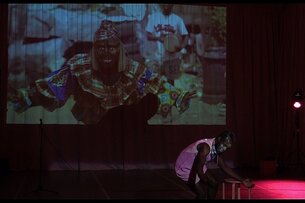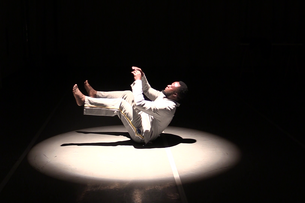#ResidencyInsights
Shingo Ota and his theatre company ›Hydroblast‹
by
Fabio Neis
Themes
Residencies
1. During your three-week residency at PACT your theatre company ›Hydroblast‹ worked on the script of ›Ghosts take the taxi‹ and we have seen you all concentratedly learning text in different places around the building. While you were so intensely occupied preparing your premiere did you have a chance to relate to the local area and what were your impressions of PACT?
During our stay the team at PACT were very welcoming and supportive. It was a special time for all of us and we got to know more about the processes behind PACT that have made it such a great artists’ center and also how the city faces up to its past history. Our company members explored individually and learnt about the house as well as the local area. For me the accomplished approach to the renovation of old buildings was very impressing. In Japan there are discussions about how we should deal with the debris of the disaster and whether it should remain as a memory. So during my stay I got some ideas to rethink these questions and reflected on them in the script.
2. Your play deals with The Great East Japan Earthquake in 2011 which is the strongest earth tremor ever measured in Japan. What effects did this disaster have on you as individuals and what do you feel about its impact on Japanese society now many years later?
I was staying in the West of Japan when the disaster happened so I didn't feel the shock when it occurred. A few days later I went back to my house in Tokyo where we experienced blackouts and food scarcities. It was then that I felt the nature of the threat. Afterwards I heard the remarkable story of taxi drivers who had seen ghosts in their cars and driven them along the coastal roads of the Tohoku region which was badlydamaged by the tsunami. Local reporting has taken up on this phenomenon. Although I was touched by the stories of the drivers who saw the ghosts, it seemed to me that these tales were a product of fantasy as they not only spoke of the existence of ghosts but also of having conversations with them.
It is important to us that we have a sense of guilt (Survivor’s Guilt) that we survived, not to say whether there are ghosts or not, but rather to continue the dialogue with those who died.
So I felt that I should reflect again on the existence of "ghosts" in order not to place this phenomena in the framework of entertainment / consumption. Ghosts can act more actively on our lives. To face ghosts this way is to adopt a position that "does not forget" the tragedies and disasters of the past, because it is continuing the dialog with the past and will lead you to not make the same mistakes again. For example we define ghosts as invisible – those not to be visualized. They should though be visualizable but are figures that are hiding. By redefining such ghosts, the existence of people who live with their presence begins to emerge: Living/dead, ghost/non-ghost, center/periphery – I hope that such boundaries will dissolve through this kind of theatre.
We partly produced the piece in Germany and it was here that we made the decision to deal with the negative legacy of the incident. What comes to my mind living in Japan is the debate over ›dark tourism‹ and whether we should allow this at the site of the nuclear power plant accident or not.
Shingo Ota is a writer and director based in Tokyo, Japan. He is currently developing a new performance together with his theatre company Hydroblast which will premiere in February 2019 in Tokyo. During their residency at PACT the group worked on the script of ›Ghosts take the taxi‹.The performance circles around theappearance of ghosts witnessed by taxi drivers after the Great East Japan Earthquake in 2011, and more generally on the visibility or invisibility of places and people in different cultural contexts.
